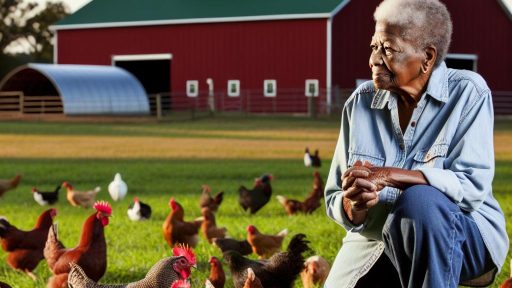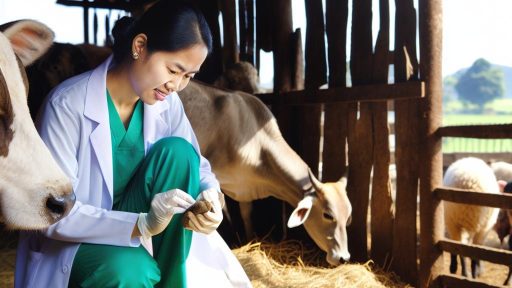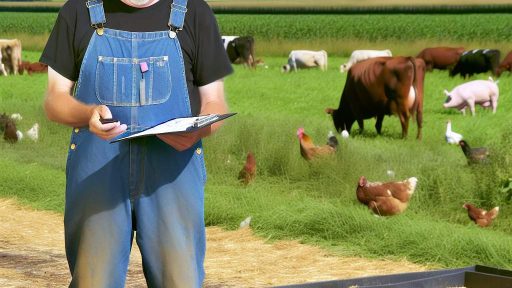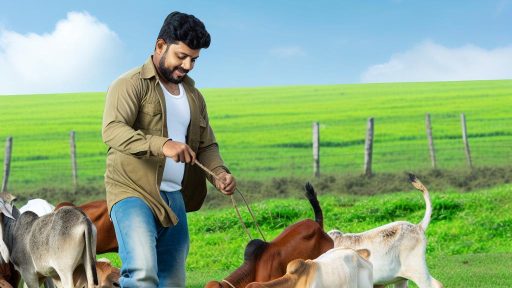Introduction to Poultry Management
Importance of Parasite Control
Poultry management is crucial for successful farming.
Effective parasite control can significantly enhance bird health.
Healthy birds yield better production rates and quality.
Parasites affect growth, egg production, and overall well-being.
They also increase susceptibility to diseases.
Thus, understanding parasites is essential for poultry managers.
Types of Common Poultry Parasites
Poultry face threats from various parasites.
Internal parasites include worms and protozoa.
External parasites like mites and lice also pose risks.
Each parasite has its unique life cycle and impact.
Identifying these parasites is the first step in control.
Signs of Parasite Infestation
Poultry exhibits clear signs of parasite infestations.
Look for weight loss and poor feather condition.
Birds may also show lethargy or reduced egg production.
Observing unusual behavior can also indicate problems.
Transform Your Agribusiness
Unlock your farm's potential with expert advice tailored to your needs. Get actionable steps that drive real results.
Get StartedRegular monitoring helps in early detection.
Strategies for Effective Control
Implementing a comprehensive control strategy is vital.
Regular cleaning and sanitation reduce parasite populations.
Quarantining new birds helps prevent new infestations.
Using appropriate medications can mitigate health risks.
Incorporating biosecurity measures also increases effectiveness.
Monitoring and Evaluation
Continual monitoring is necessary for successful control.
Regular health checks help identify problems early.
Keep records of infestations to recognize patterns.
Adjust your strategies based on evaluation results.
This proactive approach leads to healthier birds.
Types of Parasites Affecting Poultry: Identification and Impact
Understanding Common Poultry Parasites
Poultry can suffer from various parasites that affect their health.
These parasites can cause significant economic losses in poultry farming.
Identifying these parasites early is crucial for effective management.
External Parasites
External parasites live on the surface of poultry.
Common examples include mites, lice, and fleas.
Mites, such as the red mite, thrive in poultry houses.
They feed on blood and can cause anemia in birds.
Lice infestations lead to feather loss and irritability.
Additionally, fleas can transmit diseases between birds.
Internal Parasites
Internal parasites reside within the bird’s body.
Common internal parasites include worms and protozoa.
Intestinal worms, like roundworms, compete for nutrients.
This competition can lead to poor weight gain and stunted growth.
Showcase Your Farming Business
Publish your professional farming services profile on our blog for a one-time fee of $200 and reach a dedicated audience of farmers and agribusiness owners.
Publish Your ProfileProtozoan parasites, such as coccidia, affect the intestinal lining.
Infection can cause severe diarrhea and dehydration.
Impact of Parasite Infestations
Parasite infestations can have numerous negative effects.
They can reduce feed efficiency, leading to higher costs.
Moreover, infested birds often show decreased egg production.
Severe infestations may also lead to increased mortality rates.
Consequently, farmers must monitor their flocks closely.
Identifying Symptoms of Infestation
Recognizing the symptoms of infestations is essential.
Signs of external parasites include excessive scratching and feather loss.
Birds may also appear restless or irritable.
For internal parasites, look for weight loss and poor stool quality.
Chronic infections can manifest as stunted growth in young birds.
Prevention and Control Methods
Effective management practices can help control parasites.
Regularly cleaning and disinfecting poultry housing is vital.
Pest control measures should be routinely implemented.
Introducing herbal remedies may also help manage infestations.
Consulting with a veterinarian can provide additional guidance.
Signs of Parasite Infestation in Poultry
Visible Symptoms
Poultry infested with parasites often show visible symptoms.
Observe for feather loss around the body.
You may notice skin lesions or irritation.
Additionally, watch for unusual behaviors like excessive pecking.
Weight Loss and Decreased Production
Infested birds frequently lose weight rapidly.
Monitor their egg production closely.
For example, a decline in egg production signals potential issues.
Furthermore, chickens may appear lethargic or less active.
Poor Feed Conversion
Parasites can impact how efficiently birds convert feed into body mass.
Observe any sudden changes in feed consumption patterns.
Birds may eat more yet gain less weight.
Changes in Droppings
Check the droppings for abnormalities.
Diarrhea or unusually watery droppings indicate possible parasite issues.
Also, look for blood or mucus in the droppings.
These signs require immediate attention.
Respiratory Symptoms
Some parasites can cause respiratory issues in poultry.
Listen for coughing, sneezing, or wheezing sounds.
Birds may also exhibit labored breathing.
These symptoms may accompany other health problems.
Behavioral Changes
Watch for changes in your flock’s behavior.
Infected birds might isolate themselves from the group.
In addition, excessive scratching or preening can occur.
Such behaviors often point to distress caused by parasites.
Showcase Your Farming Business
Publish your professional farming services profile on our blog for a one-time fee of $200 and reach a dedicated audience of farmers and agribusiness owners.
Publish Your ProfileLearn More: Innovative Queen Bee Breeding Methods For Robust Colonies In U.S. Agriculture
Preventive Measures: Best Practices for Reducing Parasite Risks
Regular Health Assessments
Conduct regular health assessments of your poultry stock.
Veterinarians can identify early signs of parasitic infections.
Routine check-ups help maintain overall flock health.
Optimal Housing Conditions
Provide clean and well-ventilated housing for your birds.
Good ventilation reduces the humidity that parasites thrive in.
Additionally, keep the environment dry and free from waste.
Effective Biosecurity Measures
Implement robust biosecurity measures to limit parasite entry.
Limit access to the poultry area by unauthorized personnel.
Designate specific footwear and clothing for those who enter.
Proper Feeding Practices
Use high-quality feed to improve the birds’ immune systems.
Cater feed to the specific energy needs of your flock.
Avoid feeding birds off the ground to deny parasites access.
Pasture Management Techniques
Rotate pasture areas regularly to prevent parasite buildup.
Leave pastures unoccupied for a period to break parasite life cycles.
Introduce integrated grazing with other livestock when possible.
Regular Deworming Schedule
Establish a consistent deworming schedule for your flock.
Consult with your veterinarian for the best deworming products.
Rotate dewormers to prevent resistance from developing.
Monitoring and Record Keeping
Keep detailed records of health assessments and treatments.
Monitoring trends can help identify potential parasite issues.
Use these records to inform future management decisions.
Educational Resources and Training
Provide training for staff on parasite management practices.
Encourage attendance at workshops and seminars on poultry health.
Utilizing educational resources can improve overall flock management.
Discover More: Understanding the Role of Sensors in Precision Livestock Farming
Environmental Management: Sanitation and Biosecurity Protocols
Importance of Sanitation
Sanitation plays a crucial role in poultry management.
It prevents the spread of diseases and parasites.
Effective sanitation methods reduce pathogen levels in the environment.
Farm operators should regularly clean and disinfect facilities.
They must also ensure proper waste management to avoid contamination.
Implementing Biosecurity Measures
Biosecurity measures protect poultry from external threats.
These measures help control the introduction of diseases and parasites.
Farm owners should restrict access to poultry areas.
They must train staff on hygiene practices and disease prevention.
Utilizing footbaths and hand sanitizers can minimize contamination.
Cleaning and Disinfecting Procedures
Regular cleaning routines maintain a safe environment.
Farmers must establish a clear cleaning schedule.
Using appropriate cleaning agents is critical for effectiveness.
After cleaning, thorough disinfection of structures is necessary.
Showcase Your Farming Business
Publish your professional farming services profile on our blog for a one-time fee of $200 and reach a dedicated audience of farmers and agribusiness owners.
Publish Your ProfileFurthermore, farmers must address hard-to-reach areas.
Pest Control Strategies
Implementing pest control is essential for poultry health.
Pests can harbor and spread parasites and diseases.
Farmers should regularly inspect for signs of infestations.
Effective pest management includes traps and baits.
Collaboration with pest control experts can enhance effectiveness.
Monitoring and Evaluation
Continual monitoring of sanitation practices is essential.
Farmers should evaluate the effectiveness of biosecurity protocols.
Regular audits can identify areas for improvement.
Reviewing records helps to track the success of sanitation efforts.
Moreover, feedback from staff can provide valuable insights.
Learn More: Essential Housing Requirements for Comfortable Swine Rearing
Chemical Control: Overview of Antiparasitic Treatments
Understanding Chemical Control
Chemical control refers to the use of substances to manage parasites in poultry.
This method offers various solutions for effective parasite management.
Farmers often rely on chemical treatments to protect their flocks.
Effective application ensures the health and productivity of poultry.
Types of Antiparasitic Treatments
Antiparasitic treatments come in several forms.
Medicated feeds serve as a common choice among poultry farmers.
These feeds contain specific drugs to target parasites directly.
Water-soluble solutions also provide an effective method.
Farmers can administer these solutions through drinking water.
Moreover, topical treatments are available for external parasites.
Popular Antiparasitic Agents
Various agents exist, each suited for different parasites.
- Ivermectin is widely used for internal and external parasites.
- Fenbendazole helps control gastrointestinal worms effectively.
- Praziquantel targets trematodes and cestodes.
Farmers must choose the right agent for their specific needs.
Application Guidelines
Proper application is crucial for maximized effectiveness.
Farmers should follow the manufacturer’s instructions closely.
Regular monitoring of the flock will help in assessing treatment success.
Additionally, rotating medications can prevent resistance.
Safety Considerations
Using chemical treatments also requires safety precautions.
Farmers must adhere to withdrawal times before selling poultry.
This practice ensures that drug residues do not enter the food supply.
Furthermore, personal protective equipment is essential during application.
Delve into the Subject: Ensuring Animal Welfare In Organic Livestock Operations And Management
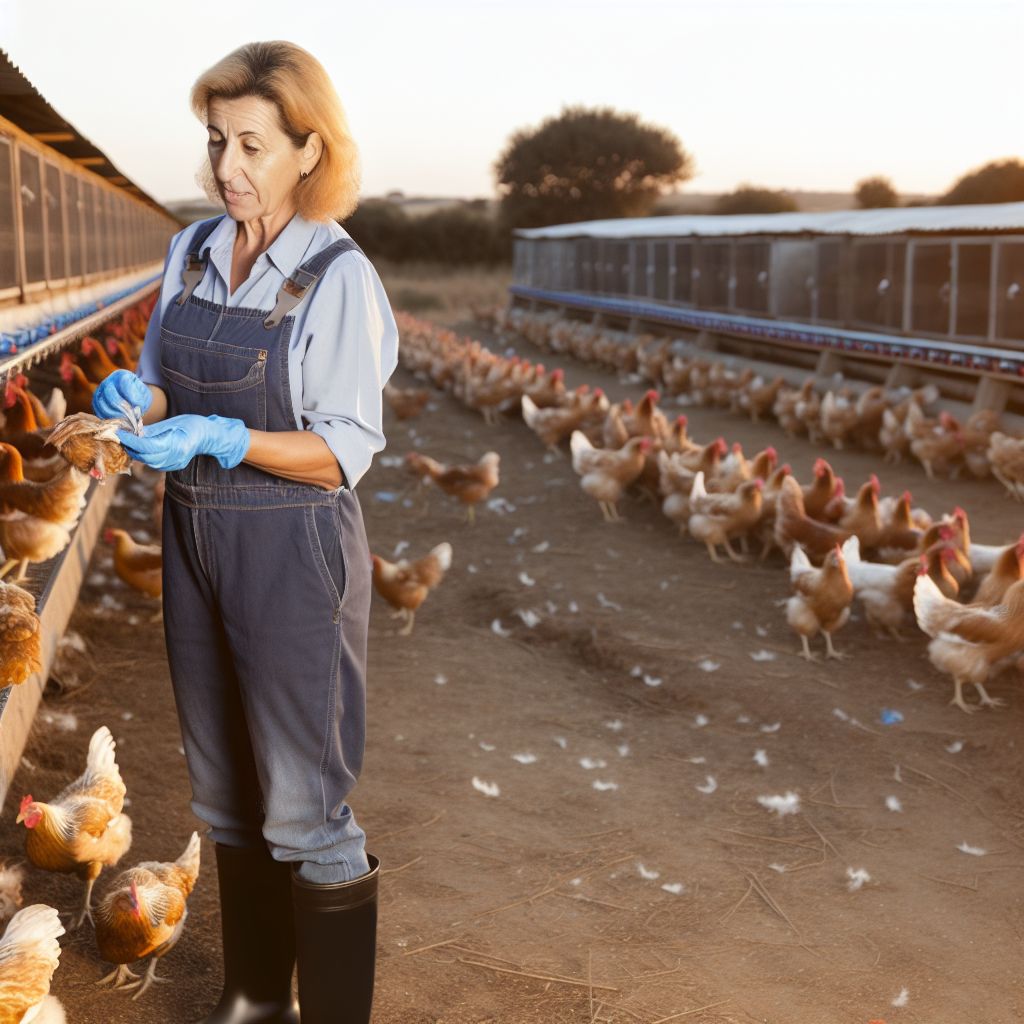
Integrated Pest Management Strategies for Poultry Farms
Understanding Integrated Pest Management (IPM)
Integrated Pest Management (IPM) combines multiple strategies to control pests effectively.
This approach emphasizes the use of sustainable practices.
IPM helps minimize the reliance on chemical interventions.
As a result, it promotes healthier poultry and safer products.
Farmers can adopt IPM to address both current and future pest challenges.
Monitoring and Identifying Pests
Regular monitoring is essential for effective pest management.
Poultry farmers should routinely inspect flocks for signs of infestation.
Showcase Your Farming Business
Publish your professional farming services profile on our blog for a one-time fee of $200 and reach a dedicated audience of farmers and agribusiness owners.
Publish Your ProfileIdentification is crucial for choosing the right management strategies.
Pests like mites, worms, and ticks require specific control measures.
Farmers can keep records to track pest patterns over time.
Preventive Measures
Prevention is the first line of defense against poultry pests.
Effective biosecurity practices can reduce pest introduction.
Farmers should maintain clean and organized facilities.
Good ventilation also helps minimize moisture and humidity.
Providing proper nutrition strengthens the immune systems of birds.
Mechanical and Physical Controls
Mechanical methods play a vital role in an IPM strategy.
Farmers can use traps to reduce pest populations effectively.
Other physical strategies may include barriers or netting.
Regular cleaning is also essential to disrupt pest life cycles.
Cultural Practices for Pest Control
Cultural practices significantly impact pest management success.
Rotating pastures helps break pest life cycles.
Ensuring proper stocking rates can reduce stress on poultry.
Additionally, time of feed and water availability can affect pest attraction.
Biological Control Methods
Biological controls utilize natural predators to manage pests.
Using beneficial insects can protect against harmful species.
Farmers may introduce nematodes or parasitic wasps for control.
This approach is environmentally friendly and sustainable.
Chemical Control Options
When necessary, chemical controls may be employed carefully.
Farmers should select treatments that target specific pests.
Using the lowest effective dosage minimizes environmental impact.
It is crucial to follow safety guidelines during application.
Education and Training
Continuous education is vital for effective pest management.
Farmers should stay informed about new pests and control methods.
Participating in workshops and seminars can enhance knowledge.
Additionally, collaboration with agricultural experts improves practices.
Evaluating IPM Effectiveness
Regular evaluation of IPM strategies is essential for success.
Farmers should analyze pest control outcomes over time.
Adjusting practices based on evaluation helps improve effectiveness.
Feedback from farm workers also provides valuable insights.
Monitoring and Assessment
Importance of Monitoring
Monitoring is crucial for effective parasite control in poultry management.
It helps identify infestations before they escalate.
Regular evaluations ensure that control measures are effective.
Techniques for Assessment
Utilize fecal egg counts to monitor parasite levels.
This method offers a clear picture of the infestation status.
Supplementary blood tests can help assess the health impacts on birds.
Keep detailed records of assessments to track changes over time.
Visual Inspections
Conduct regular visual inspections in poultry houses.
Showcase Your Farming Business
Publish your professional farming services profile on our blog for a one-time fee of $200 and reach a dedicated audience of farmers and agribusiness owners.
Publish Your ProfileLook for signs of parasites such as feather loss or poor body condition.
Monitor environmental conditions that favor parasite growth.
Evaluating Control Effectiveness
Regularly review the methods used for parasite control.
Assess whether treatment protocols yield desired results.
Adjust strategies based on the effectiveness of current measures.
Creating an Effective Monitoring Plan
Develop a comprehensive monitoring plan tailored to your flock.
Include timelines for assessments and treatment evaluations.
Incorporate input from experienced veterinarians and nutritionists.
Case Studies and Success Stories
Learn from case studies where effective monitoring made a difference.
Study success stories to identify best practices.
Share insights with other poultry managers to foster community learning.
Sustainable Approaches to Poultry Parasite Management
Understanding Sustainable Practices
Sustainable practices effectively reduce poultry parasite infestations.
They utilize environmentally friendly techniques that promote health.
These methods support the well-being of poultry without harming ecosystems.
Integrated Pest Management
Integrated Pest Management (IPM) combines various control strategies.
This approach maximizes effectiveness while minimizing risks to the environment.
IPM encourages regular monitoring and assessment of parasite levels.
Farmers can identify specific stressors affecting their poultry.
Consequently, they apply targeted interventions based on findings.
Biological Control Agents
Biological control agents help manage parasite populations naturally.
These include beneficial organisms that prey on pests.
Using nematodes or predatory insects can significantly reduce infestations.
This reduces reliance on chemical treatments.
Cultural Practices
Cultural practices also play a vital role in prevention.
Rotating grazing areas prevents parasites from establishing a home.
Maintaining proper hygiene in poultry housing minimizes contamination.
These strategies enhance overall flock health and resilience.
Use of Natural Treatments
Natural treatments offer alternative solutions for parasite control.
Essential oils and herbal remedies can deter parasites effectively.
Integrating these treatments into a management plan promotes sustainability.
Moreover, they pose fewer risks to poultry than synthetic chemicals.
Education and Training
Training for poultry managers enhances effective parasite management.
Educated personnel can identify issues early and implement solutions.
Continuous education keeps them updated on best practices.
This proactive approach ensures the well-being of the flock.
Collaborative Efforts and Shared Resources
Farmers can benefit from collaborating with local agricultural scientists.
Shared insights lead to improved parasite management practices.
Networking among farmers fosters the exchange of successful strategies.
This collective knowledge strengthens community resilience against parasites.
Long-Term Commitment
Implementing sustainable practices requires a long-term commitment.
Showcase Your Farming Business
Publish your professional farming services profile on our blog for a one-time fee of $200 and reach a dedicated audience of farmers and agribusiness owners.
Publish Your ProfileFarmers must consistently assess their methods and effectiveness.
Through dedicated efforts, they can achieve lasting improvements.
Ultimately, this commitment results in healthier poultry and environments.
Additional Resources
Clinical Practice Guidelines for the Diagnosis and Management of …

